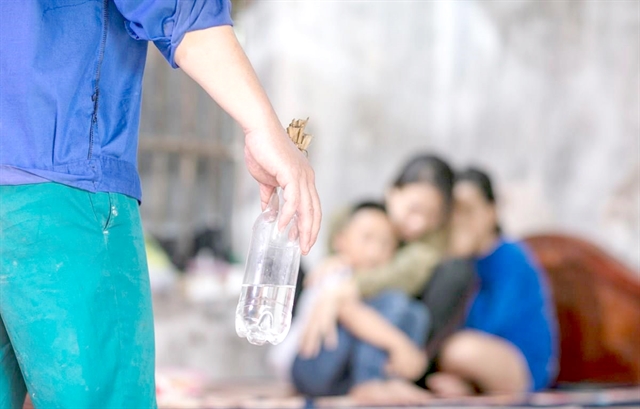 Society
Society

Nearly 32 per cent of women have experienced violence in the past 12 months.

|
| Men are believed to be the key factor in preventing violence against women and girls. — VNA/VNS Illustration Photo |
HÀ NỘI — T, a woman suffering from domestic violence in the coastal city of Đà Nẵng, has a simple dream.
“My greatest wish now is peace. I expect my son to grow up, mature and then free himself,” she said.
This is one of the most common wishes of Vietnamese women who have experienced domestic violence.
According to the National Survey on Violence against Women in Việt Nam released in July last year, almost two out of every three women, or nearly 63 per cent, experience one or more forms of violence, including physical, sexual, emotional, and economic violence, as well as control over their life by husbands. Nearly 32 per cent of women have experienced violence in the past 12 months.
The survey shows the complexity of violence against women and girls. Nine years since the first census, the proportion of the most common forms of violence perpetrated by husbands or partners against women in Việt Nam, according to women in interviews, decreased only slightly.
Married 18 years, 15 years living in hell
Born in a northern mountainous province, at 22 years old, T followed her husband, a long-distance driver, to live in Đà Nẵng. After only three years of living together and having a son, her husband became cold and verbally abusive. Then she learned her husband had another wife and had fathered a child with her.
T was very disappointed and in great pain. She tried to be patient for the sake of their family. She tried to speak to her husband gently but to no avail leaving her forced to live with the estrangement and violence of her husband.
"He beat me with his hands, feet and all kinds of things. I tried not to let my children know that their mother was being beaten, but once I was beaten until my jaw broke and had to go to the hospital, my children knew everything," T choked when talking about her husband's violence.
"Knowing I was beaten, my son comforted me, told me to try to endure and said when he was older and finished school, he would have a job and take care of me," T. said.
T’s pain was eased when she received legal, psychological and financial support and assistance from the Đà Nẵng City Women's Union.
Via clubs under a project to call for community prevention of violence against women and girls, husbands are encouraged to join clubs to help change awareness of protecting women and girls.
"I am very grateful to the Women's Union and the Men's Pioneers Club. During the COVID-19 pandemic, I received financial support from the union helping me get rid of negative thoughts, and boldly share with me the difficulties in life," T said.
Men - the decisive factor to prevent gender violence
Khuất Thu Hồng, director of the Institute for Social Development Studies, said: “Patriarchal ideology is deeply rooted in Vietnamese men's thinking as the main cause of domestic violence. Accordingly, a man who claims to be the head of the family has the right to educate and to discipline his wife and children.”
Hồng said that to promote gender equality and effectively prevent violence against women and girls, in addition to advocacy activities from women, it is necessary to take action to change perceptions, making men an important part of every gender equality campaign and to preventing gender violence.
“Studies in the world have shown that costs will be paid if men do not change and retain patriarchal thinking in the family,” Hồng said.
Initial success
In a project on community education to prevent violence against women and girls in Đà Nẵng by the United Nations Entity on Gender Equality and Women's Empowerment (UN Women), the Đà Nẵng City Women's Union co-ordinated the second phase implementation from 2017 to 2020, with the sponsorship of the Australian government, which has continued the success of phase 1 (2014-2016).
In the project, organisations have lobbied the community to give them a deeper insight into women's empowerment to create a more balanced, equal relationship of power that requires respect and empowerment rights. This is seen as a commitment to prevent violence against women in the home as well as in society, said Elisa Fernandez Saenz, Country Representative of UN Women in Việt Nam.
The project is implemented in 11 communes and wards in the city. The project's effectiveness is a comprehensive, staged and benefit-based approach to call for communities to change social stereotypes, promote gender equality and prevent violence against women and children.
Đặng Vân, 85, chairman of Hòa Cường Bắc Ward’s Men Pioneering Club in Hải Châu District, said: “The project is on the right track and at the heart of the issue. The formation of clubs has created community forums, helping club members discuss issues related to gender equality and violence against women. It increases men's awareness and skills in maintaining healthy relationships and resolving nonviolent conflicts.” — VNS